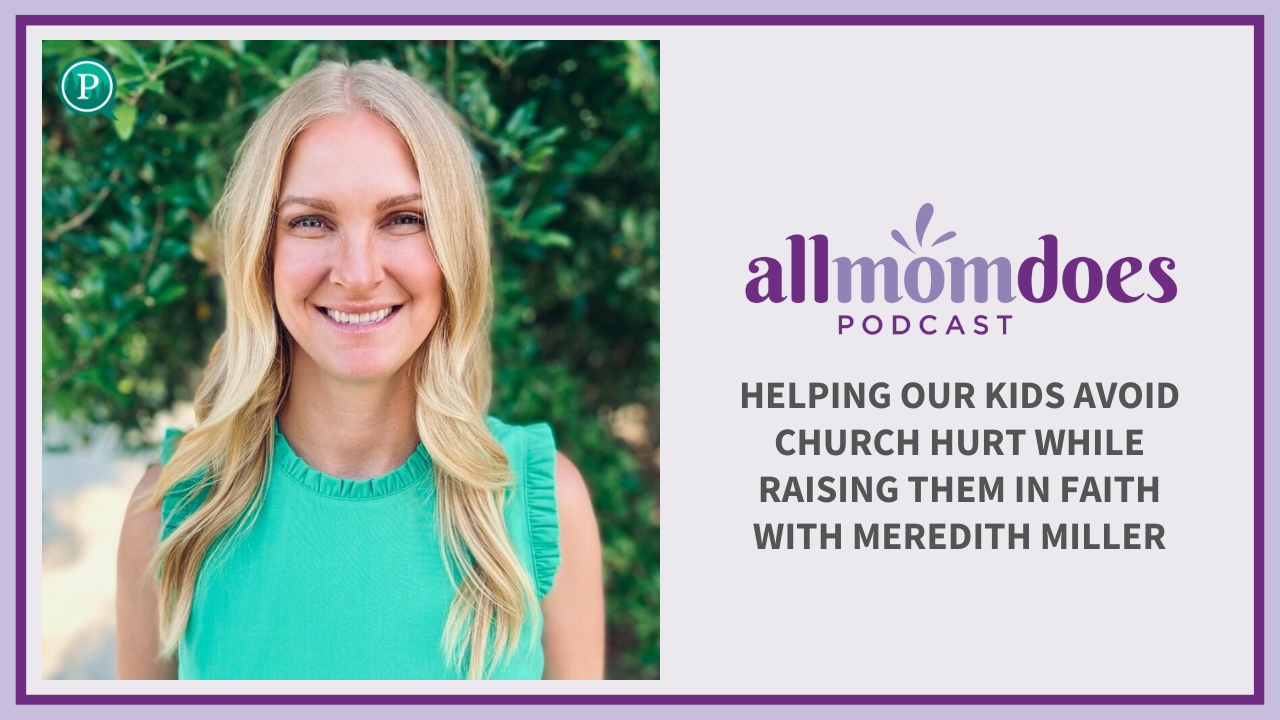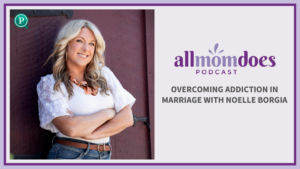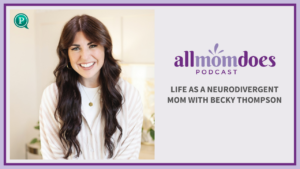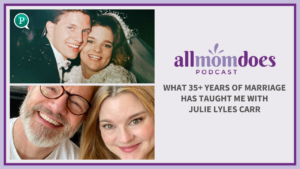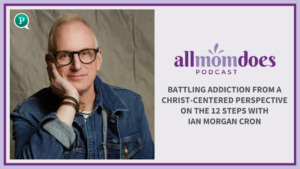The stats are everywhere and they’re tough; about half of people raised in a church are choosing to lead their adult lives outside of the church. Why? On this episode of The AllMomDoes Podcast with Julie Lyles Carr, guest Meredith Miller explains the top two reasons this is happening and why raising our kids in a family culture of curiosity and questions is one of the best faith tools we can give them.
Show Notes:
Find Meredith: Online | Instagram
Find Julie: Online | Instagram | Facebook | X (Formally Twitter) | Pinterest
AllMomDoes | Instagram | Facebook | X (Formally Twitter)
Transcription:
Julie Lyles Carr:
So you’re getting up early, you’re taking those kids to Sunday school, you’re doing the Bible blast or you’re doing the quiz thing, or you’re trying to do all the things to make sure that when your kids are launching from your home, that they have a basis of faith. And yet, we see statistics that are telling us that a lot of those efforts are not working really well. So what do we do? What are the things that we can do right now in our parenting to try to avoid some of the hurts and some of the challenges that people say that they’re experiencing when they’re raised in homes of faith? I’m Julie Lyles Carr. This is the AllMomDoes Podcast. I am really thrilled to have a conversation today with Meredith Miller. She’s going to help us put all this into perspective. She’s going to help us unpack some of the things that we’re seeing on the other side when kids are getting launched, when it comes to their faith walk. So Meredith, thank you so much for being with me today.
Meredith Miller:
Oh, I’m so thrilled too, and thanks so much for the invitation. I appreciate it.
Julie Lyles Carr:
Absolutely. So Meredith, usually we start off with guests, I mean, listener wants to know, where are you from, where do you live, what do you do, what are all the things? So fill us in on all of that.
Meredith Miller:
All of the things. I am a southern Californian, almost my entire life, minus five years when I lived in Chicago while I worked for a church. And we’ve been back home in California the last four or so. I’ve got two boys who are eight and 10, and we are at this moment still on our summer break. We have a later school calendar than some. And we are church planters, my husband and I. We’re both pastors. We met in seminary at Fuller Seminary in Pasadena, and did not ever expect to start the church, but sort of found our way there. And I spent a lot of my career life in kids and family ministries in different forms, which has then meant the last few years I’ve spent a lot of time writing to parents who are really eager to do well by their kids and well by their God at the same time, and know that there’s just a lot to navigate. So that’s been super fun.
Julie Lyles Carr:
Absolutely. I am just excited to just dive right into this topic, because it’s something that honestly, Meredith, I feel like sometimes we dance around. And yet, there’s just no denying at this point, when you look at some of the statistics on Pew Research and other places, that we’re seeing something that is, we didn’t want to see it as parents. We’re seeing kids who are going into those adult stages and are saying, “My church experience wasn’t great. Maybe I understand what Mom and Dad were trying to do. Maybe I don’t.”
But bottom line, we’ve had people who’ve been very celebrated, leaders in the church have major very public issues. We’ve had different initiatives where people were trying to help kids launch into adult years without having a lot of regrets, and yet some of those very efforts have meant that those kids have felt shamed or maligned or set to the side. And here we are today with some real challenges, trying to correct some of that. So what are some of the trends, and I say trends, not to mean trending, I just mean it in terms of population, what are some things that you are seeing? Just give us a good snapshot of the landscape today about kids who’ve been raised in homes of faith, and their launching. What are some of the things that you’re seeing, some of the feedback that you’re getting?
Meredith Miller:
Well, what’s interesting is that while we’re having the conversation in 2023, we are seeing that we’ve got a couple of decades in research trends that are saying roughly half, and certain research bodies are going to go a little higher, a little lower, but we’re looking at about half of kids that are pretty active church participants, whose families are pretty engaged on the faith front, are going to move into adulthood and go ahead and leave that faith behind. Now, there’s some interesting parallel research that asks if they’ll return at some season in a future date. It used to be more common that you could be assured of a return rate around two thirds to three quarters when a person married and had kids of their own. That is a declining number.
There are increasingly people of parenting age who are saying that they don’t want their kids in religious spaces. Fundamentally, they are not sure that those are spaces that are good for them. And so we have, I think, a new question that’s been cropping up, where young adults and young families are not so sure if the church is a place that’s safe and good for their kids because when they look back on their stories, they aren’t so sure this church was a place that was safe and good for them. And a lot of that is about church experience or perhaps family faith culture. It’s often less about God themself.
Their feelings about Jesus tend to be positive. They tend to be a lot more of them saying they still really love God. In fact, that’s part of why it’s so heartbreaking for them and so confusing. It’s the mismatch between the Jesus they know and the Jesus they want to follow, and finding a place to do that with others in light of how challenging it can be, or at a minimum, risky.
Julie Lyles Carr:
Right. It feels like in a way what you’re saying, Meredith, is that we need to get out of the way when it comes to God, when it comes to relationship with Jesus. And yet, that can sound so challenging to do. Because for so many of us, we want the system or we want the Sunday school that offers all the things. Or if we grew up in a certain environment and we felt like that wasn’t great, then we do a 180 to a different environment. If we grew up in a really conservative church, then maybe we trend toward a church that’s very modern and has all the toys, or if we grew up in that kind of a church and felt that it was a lot of show, but maybe not a lot of heart, then we may be tempted or want to go back into an environment that feels a little bit more liturgical, or all these things that we’re trying to do.
So what do you identify as a couple three of the primary issues that are really engaged in what we’re being told by people who have launched and have said, “I’m not sure I want that church experience for myself or for my kids.” What are some of the things that they tend to say, hey, this is where things went really sideways for me?
Meredith Miller:
Yeah, I think a lot of it comes down to when we are sort of stewarding the faith story in our families, we’re representing God. And the God that a kid meets in our families, in our churches, they think that’s what God’s really like. Especially for a child, they’re going to trust whoever is their sort of authority adults. And then they move on into adulthood and it’s like, wait, I don’t know if that’s totally what God is like. So I think there’s a batch of that where some poor theological ideas are really rampant, and they haven’t really been interrogated as thoroughly as they need to be. We maybe assume kids will just grow out of them or they’ll nuance them, but often they don’t. They hold onto them until those ideas, those misrepresentations of God, hurt them.
So a really common example of this, probably the most common has been lingering around ever since the research from Notre Dame came out in around 2008, 2009, and it’s around the idea of faith being moralistic, that what young people are often raised in is a system that tells them that following God means you have this list of things we do. We read our Bible and we attend church and we memorize our verses and we’re nice to people, and it means we have a list of things we don’t, right? We don’t swear and we don’t maybe dance or whatever is on your church’s-
Julie Lyles Carr:
Preferred list.
Meredith Miller:
We probably all could name the list pretty quick. Well, then kids think that their faith is fundamentally an effort in list management. And that often means that they either become really exhausted and like, “Why does God want me to work this hard? And what about Jesus’ whole thing about a yoke that’s easy and a burden that’s light, and how come it feels like that’s not allowed?” And so that’s one side. Often it’s exhaustion from carrying a moralistic faith for so long, trying so hard to be so good. The other one that they’ll often speak to is that crisis will hit, life’s hardships will come. And they sort of thought the deal was that if they were managing that do and don’t list really well, God would keep that from happening. So what gives? Where’s God now?
They weren’t necessarily told stories, both in the Bible or maybe in their families or in their faith communities, about a God who entered into suffering and walked with or gave grace for huge mistakes. They don’t have that in their toolbox. And so crisis then does extra damage, but it often just stems from spending a lot of energy telling kids and teens to try hard to be good and less bad, all the time.
Julie Lyles Carr:
Right. I was having a conversation with someone recently in which we were asking each other some different people in our lives and “Hey, are they walking with God and are they doing this and doing that?” And I had to stop myself and say, you know what? Even though, I do not believe this is the right measure, I still do it, Meredith, where I begin to respond by how engaged someone is at their church. Now, let me be clear. I think there is a place for the local church, and I think that that is a great place to find community of faith, but your level of volunteerism and involvement and how often you’re going to small group really doesn’t have just a whole lot to do really internally with how you’re doing in your one-on-one personal relationship with God.
And yet, that’s this external measure that so often we look to, which then makes me think about the other places of external measure that I make for myself and the places where I feel like, “Oh, I was really walking with God during that time because I was doing X, Y, Z, or I wasn’t doing X, Y, Z.” I’ve done it to myself. So it would make sense that I’m also potentially putting that on my kids as well.
Meredith Miller:
Absolutely.
Julie Lyles Carr:
So how do we navigate this really tender space? Because the other thing that you and I both know, having walked the walk for a long time, is there are things, there are choices that we can make our lives harder. There are consequences for certain behaviors. There are complexities that can arise in our lives, if God’s ideal is to do it this way and we choose to go that way. But I get exactly what you’re saying, that when that becomes the nexus of everything in a faith walk, how that doesn’t serve us. So how do you think about it and how do you talk to parents about walking in this very tender space between making sure our kids understand the grace and the redemption of God without underselling some of the things that aren’t walking in those things that are his ideal, and yet at the same time, not make that the crux of the whole thing? How do we do that?
Meredith Miller:
Yeah, yeah. Dallas Willard once talked about a gospel of sin management, and I think it was that very exact shadow side that sin matters, but sin is not the start of the story. It’s not the end of the story. The presence of God is the start of our story, and always is God’s dream. And the end of our story is the presence of God. And I want to keep encouraging the adults who have kids in their lives that you can focus, especially in the young years, on helping young people get to know God and discover that God can be trusted. Because when we discover God’s trustworthiness and we find that our life is anchored in believing what it would mean to do life in the presence of God, well, that trust shapes whatever obedient sorts of things any of us might do. I mean, I don’t do things because somebody tells me to, unless I totally trust the person who’s trying to tell me to.
Right? We’re in summer mode. We’ve got a public pool, and there’s this awesome lifeguard staff from the YMCA that’s running that. And my kids are really lovely, solid swimmers. And nevertheless, when they’re asked to not dive here or do dive there, it’s because the lifeguard knows the depth of the pool and they wear that uniform. And it’s not just that they are in charge or conveyors of authority, it’s that they’re trustworthy young people who’ve gone through training. There’s something about their trustworthiness. We think it’s their authority, but it’s not really. It’s not because they have the most power in the pool. People listen to them because they’ve shown themselves to care about keeping us safe. And there is a very similar thing with God as there would be with any other relationship, that if a kid can spend enough time really, like have the time to discover God could be trusted, that can be the thing that helps shape them towards wanting to choose wise things.
Julie Lyles Carr:
I think that’s really powerful to consider, is that so often you’re right, we have approached God as an authoritarian figure, which again, he does have authority. That’s not to say that he doesn’t. And yet, in our human hearts, how important it’s for us to understand that place of trust and are we conveying that to our kids? Maybe we haven’t settled the notion of God’s trustworthiness for ourselves. I mean, do you feel often that even though you may have parents who say, “Well, I was raised in this way and I want to make sure my kids don’t necessarily have that,” and they go toward a different way of church or they go toward a slightly different variation, do you find that for a lot of parents that the core issue is they’re still grappling with their own sense of God being trustworthy? Is that part of what’s at play here?
Meredith Miller:
Absolutely. And I mean, one thing that I think is fascinating about this whole issue is that the research around creating space for questions and doubts would suggest that the more a young person is encouraged in that, the better they fare across the adult transition. And the reverse is true. The more a young person is given the answers to questions in black and white ways, the worse they do, because it has done exactly what you experienced. It has created this idea that they can’t think for themselves or work through things that are complicated or have a lot of nuance to them. Somebody has to tell them what to do, where they don’t know how to engage their own critical thinking when it comes to the world and their faith. And so it’s important that we remember that opening up the space for questions for kids is actually a faith building skill.
I think a lot of times we think that we should give them a lot of good religious information, good bible knowledge, good bible stories, good doctrine, and that they’ll be equipped with all of that information to then take it into the world. But it increasingly seems that research on young people and their faith is that they need time and space and even more questions than answers. They need adults who say, “I don’t know about that one. I have some thoughts. I notice how scripture says this, and I’ve heard people who’ve said that, but I also am not entirely sure.” I think sometimes we worry that if we don’t have answers to questions, it’s somehow hurtful to kids’ faith. And it’s really shown to be the opposite, because there are so many complicated things to navigate in our life. And so we help show that early, instead of sort of pitching the idea that everything’s all always tidy. It’s not so tidy.
Julie Lyles Carr:
Meredith, that is so great. I had no idea that research existed, that kids tend to do better if we give room for all of that. I mean, it hits me as right. I definitely see that with some of my own kids. And particularly some of the personalities involved too, which is another thing that’s interesting to me, is I have a couple kiddos who they really like those black and white answers. Like, “I’m coming to you with this inquiry and I need you to give me something definitive.” But I also have kids who’ve really needed some space to dialogue about it and to talk and who want to know what I believe, but who also need to know that they’re not going to be held to the exact nuance of how I might say it. So that’s really beautiful and encouraging, that there is room for question.
Meredith Miller:
And not just personality, but also age, right? Kids are more concrete in their younger years and they begin to hold complexity and nuance as they move into adolescence. And being mindful that we can give some space for questions that looks different when we’re in the young years, and then we have to loosen our grip and open up as they get older because they are developmentally more able to hold layers. And that’s part of how we walk with our kids, even though it can sometimes feel uncomfortable to shift it over. But I think that piece plays in. Personality and age combined are just a place where you as a parent have… You know your kid well. You know them best, and so you use wisdom in how to help create that for them.
Julie Lyles Carr:
That’s so right. You have a new book coming out called Woven: Nurturing A Faith Your Kid Doesn’t Have To Heal From. And that subtitle, wow, is really powerful. What are some statistics you’re seeing around those who currently say that they’re grappling? They’re not sure they want to come back into a faith community, they have some hurts and some wounds? What are some of the things that you see showing up the most that people are saying they’re needing to heal from, based on their faith upbringing?
Meredith Miller:
There’s a lot that you hear about fear, that they were expected for their faith to grow in a soil of fear. And that might be around specific types of doctrinal things that they were very afraid of the way they were told about something like the afterlife. It might be that they were told Bible stories that really are not for children, and so those stories scared them. It might be that they were told that things would go wrong in their life if they did not manage those do and don’t lists just right, and they were afraid of what God would think of them if they couldn’t pull that off. But a huge theme is people who are tired of living afraid.
It doesn’t feel like it matches who God is, that their life with God would be so full of fear. And a lot of times they are realizing that’s not because of God, that’s because of the misuse of scripture, or that’s because of the nuance of theology or maybe the style in which it was presented. But they’re not eager to be in spaces that are going to keep whacking them with the Bible. They want space to connect with a God who is also gentle and compassionate towards them and towards the world. And so fear is a huge one. I think there’s also a number of folks who are staying away from more formal faith spaces because they would really like to be in conversation about the quality of our theology. And that’s really hard. It’s so hard to dialogue across difference theologically, because we are talking about how we honor God.
And so ultimately, we know our theology is about honoring God well and living our lives well in the love of God. And so I think it’s understandable why a lot of us haven’t experienced the chance to be in dialogue across difference, especially on big things, but I think there’s a lot more people who want to do that. They don’t necessarily want to simply be in a camp of people who all say what they do, say all the same things and believe all exactly the same things. They want to have more space for what have historically been called the miners of faith, and to be in different kinds of conversations about that. But not every community is really available for that. And so that feels like another big one. And then again, they’re looking at their kids and saying, “Well, I want them to have the same.” And so they wander.
Julie Lyles Carr:
They wander, yeah. Now, take me to the other side of the scale potentially. That may not be an exactly accurate way of looking at it this way, but we’ve talked about this soil of fear. We’ve talked about this moralistic focus in which what can get missed is the trustworthiness of God. On the other side of that, we’ve also seen in recent years, and we’ve seen some really big churches grow out of this kind of an approach, very emotion-based churches, very big event kind of experiences, big climactic moments that have to do with certain production values, really passionate speakers, those kinds of things. Now, it’s interesting for me because I came out of a certain church background that was a pretty reserved group. And for my kids, I wanted them to have all of this burgeoning contemporary Christian approach. And again, theologically, I’m not talking about massive differences in terms of the essentials.
I’m just saying I thought, “Oh, my kids are going to thrive because I wanted to have this kind of environment. I wanted this kind of freedom of expression, and didn’t necessarily feel like I had it. So my kids are going to love this.” And wouldn’t you know it, Meredith, womp womp womp. There are a lot of kids, who were raised in that big church kind of environment and those big production and all the stuff, who really have found issue with that kind of an approach. So talk me through what that can look like for people, people who came out of something like that who are saying, “Well, this missed the mark too.” Maybe it wasn’t so seeded in fear, but there was sort of this overpromise in some ways about, “Hey, your dreams and your thing and on and on and on, and God’s got to do it.” So how do you approach that, as you’re talking with people who have come from that experience and are now trying to navigate where they stand with God today?
Meredith Miller:
Oh, absolutely. So I mean, a lot of my church life, that’s the kind of church I worked for. So I was on the curriculum team for a very large mega church in the US, and we absolutely tried to maximize the fun of a kid’s experience, I think for the best reasons. And where we faced the greatest challenge as a kid’s ministry team was a leadership culture that most wanted kids to drag their parents to church because they thought that if parents got formed, it would trickle down into the family. And they didn’t much care what a kid experienced in the room as long as it was safe and fun. That when they got picked up, they said it was great. Now, our kids team had a different value for what we were doing in that hour, but there wasn’t alignment all the way through the church in terms of raising up young people.
And I think that that is definitely a challenge for families, that there’s a lot that’s really snazzy about the programming, but there’s not necessarily holistic support to be attentive to what helps raise young people in faith well. And I think any church, you’re only going to get so much of the best practices just because of bandwidth or resource or priority, but in the end, family wins. I mean, that is almost always the case, that the family culture is what will have the most impact on a kid’s own faith journey. And so when you’re the parent, when you find that you might be in that kind of environment, what you get to do as you start to see that clearly and realize its strengths and its weaknesses, is you get to build your family faith culture that can either lean into that community strengths or navigate around its struggles. You can create something that really works for your family while you participate in that.
If you expect it to do everything, which I think is probably one of the hard things. Those churches promise, they do everything, and you need to bring just a little bit of skepticism about that. Super well-intentioned, but no, it doesn’t. And that’s okay. Let it do what it can do, and then craft what your family needs to follow Jesus together. And that can get you really far. You don’t have to be on their program in the best way. You don’t need to be afraid of the things a church, any church, any style, can’t do. You can lean into what it can do, and then add in what it looks like for your family to be living faith together.
Julie Lyles Carr:
Meredith, that’s so important and so powerful. Because both as a parent who’s wanted my kids to have certain experiences, and also as someone who’s served on a church staff, you’re right. Churches cannot do everything. And I’ve been part of churches that have really tried, but you can’t fill in all the gaps. You only get a certain amount of time when people are in the doors, and there’s a whole lot of life that’s lived outside the doors of the church. And man, that’s really beautiful. To love your church community where it’s at, and understand that ultimately they can’t do everything. That there are places that you’re going to have to step in because that’s who your kid is with the most often.
You used a phrase that I think is really important because I don’t want anybody to be discouraged who either is trying to find a faith community or someone who’s serving in a faith community to feel like I’m just dumping on them, because I’m really not. I have found through the years that people are really well-intentioned. Parents are well-intentioned in what they’re trying to do for their kids. They do it because they love their kids, because they want to see their kids to have access to eternity and have a great relationship with God. Churches do the things they do because they’re passionate about getting out the beauty of living a life with Jesus. And in all of that well-intentioned, sometimes we happen into things that create hurt when we don’t intend for it to that create an echo that was not something that we wanted to reverberate.
How do we get to that place where we can release ourselves a little bit, as parents who listen to this conversation and go, “Oh, wow, and I’m the dumb dumb who made my kid go to that X, Y, Z thing. That probably sounded really moralistic,” or, “I’m the dumb dumb who modeled for my kid if they would just do X, Y, Z, then everything would go lovely”? And what do we do when we find ourselves navigating those moments where we realize we may have contributed or be in the process of contributing to a future hurt for our kids, even though we’re trying to be really well-intentioned and good stewards of our families?
Meredith Miller:
Yeah. And what a challenging thing to come aware of. And we all do it. We all do it in some way. And I think there is something so beautiful about families that apologize to one another well, for things big and small. But the power of saying, “I want nothing more than for you to know God and love God and follow God your whole life. And I think I might’ve missed it on this one, because I kind of thought this thing might help you do that. And now I’m sort of wondering if maybe it had this other effect instead. What do you think?” And then to listen back to our kids about what they might’ve heard or experienced. Sometimes things go over their heads.
We saw it, but it didn’t stick. And sometimes, something we thought was no big deal really sticks, in a hard sort of way. And so if we can open that conversation up to say, “I was well-intentioned, and now I’m also wondering if there was a miss here. I’d love to hear from you what you noticed, what you felt, how that went. I sent you on a youth group retreat because I thought they were going to have some really great conversations about being a teenager and dating and sexuality, and now I’m not so sure.” [inaudible 00:27:16].And to be able to say back, “It was mainly great, but this one reaction just felt so big and kind of made us feel like we were wrong to ask something, and I didn’t love it.”
And to come back in and say, “Oh, I’m sorry that happened. I hope you know that I’d love to hear any question you have to ask. Even the ones that somebody else might’ve told you you can’t ask. Or whatever the next, right? Let’s try this instead, right? I meant well, I think it might’ve missed. Let me hear from you, and then let’s try this instead.” We’re modeling what grace actually means and does for us. Grace is the thing that lets us admit we were wrong about something, and that’s not the end of the world, and we don’t wallow in the shame of it. Grace is the thing that gives us a light forward to be making change as a family. Changing faith is often growing faith, and so you’re even inviting your kid into that idea. “We’re going to make a change,” shows them that’s always part of how we follow God. We learn something new, we see something more clearly. We make changes.
Julie Lyles Carr:
That is such a fantastic and specific encouragement and direction for a conversation we probably should be having more often than not with our kids, is really checking in on them. Because Meredith, I think it’s so easy, in a world where sometimes we can feel like we’re outnumbered or we’re having to explain ourselves or whatever, when a kid starts coming to us with concerns or with questions, it can be all too easy to go on the defense in a way that feels really holy, right? Like we’re defending God, we’re defending the community of faith. We’re defending these things. And yet that’s probably not the posture that our kid needs in that moment. The posture they need is to know how much we love them and that we can make adaptation, that we can rethink some things to make sure they’re getting that central message about God’s love and his trustworthiness. That’s just fantastic. Meredith, where can listeners go to find out more about you, to find out more about your work, to find the book Woven: Nurturing A Faith Your Kid Doesn’t Have To Heal From? Where can they find all the good stuff?
Meredith Miller:
So I have a website that is my name, Meredith Anne Miller. It’s Anne with an E. And then I also write pretty often on Instagram as Meredith Ann Miller, and send out a monthly newsletter that often responds to parents’ questions and things they’re navigating, bible stories they love to hear told in fresh ways, that kind of a thing. And so that’s the big ones, and would love to meet some new people and would be so grateful if people would pick up the book. And I hope it helps parents weave a web of faith that is uniquely their own and honors God as the family they are.
Julie Lyles Carr:
Well, Meredith, this has been such a fantastic conversation. I know that listeners are going to take so much from it. And listeners, be sure that you check out allmomdoes.com and AllMomDoes on the socials, because you’ll find resources there as well that are going to help you in your faith journey, that are going to ask you some questions and make you think through some things in this world that you’re navigating. And so I’d love for you to check all that out. And I would love to chat at you too on Instagram. I’m Julie Lyles Carr, all the places. Hey, grab the link from this episode and send it to a friend who may be grappling with this, who may be thinking about this, a recent conversation maybe you’ve had over coffee, a concern that a friend has for the spiritual direction of her kids. I think this conversation is really going to be of help with such great tools and insight. Meredith, thanks again. And hey, friends, I’ll see you next time on the AllMomDoes Podcast.
Follow this podcast:

